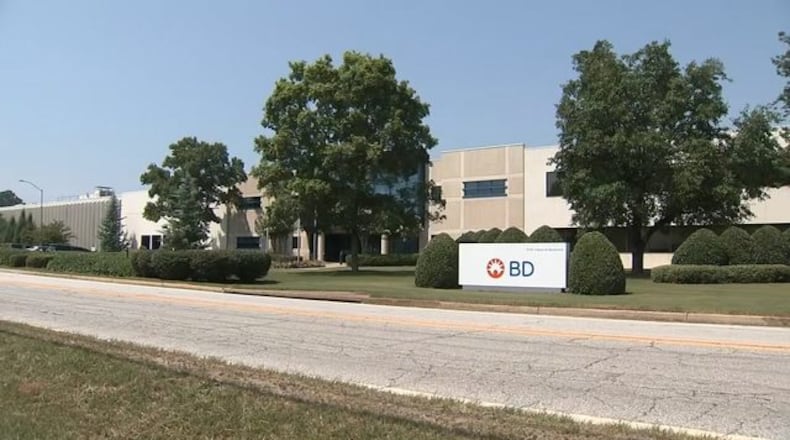State officials have reached an agreement with a sterilization plant in Covington that requires the facility to temporarily suspend operations.
The voluntary consent order was approved by a judge Monday. It precluded more forceful action by the state, which had sought a restraining order after air testing over seven days last month showed elevated levels of the carcinogenic gas ethylene oxide around the plant.
The air testing coincided with an ethylene oxide leak at the plant, which state regulators have said owner Becton Dickinson did not report properly.
BD is one of several sterilizers across the state permitted to use ethylene oxide, which has come under scrutiny since it was reclassified as a carcinogen by the federal Environmental Protection Agency in 2016. The company has said it reported the leak despite not being required to do so, because the amount of gas released never surpassed the 10-pound daily threshold that requires notification to state regulators.
The agreement struck Monday contains 20 terms of compliance, including a requirement that BD cease all sterilization from Oct. 30 to Nov. 7.
A spokesman for the Georgia Environmental Protection Division said the state will continue air monitoring around the Covington facility during the shutdown and when the plant’s operations resume. He also said the frequency of monitoring and number of sampling locations will increase and will continue for several months.
The agreement also says the company must report all unpermitted releases of ethylene oxide, regardless of quantity. BD must also reduce emissions by extending the aeration process for sterilized products and limiting the total amount of product sterilized each month.
Cindy Jordan, a member of the Say No to EtO grassroots group, said the agreement was a “step in the right direction” but she worried the company was still “self regulating.”
The state relies on companies like BD, and Sterigenics in Cobb County, to track and report their emissions to regulators.
The agreement also addresses “fugitive emissions,” gas that doesn’t pass through the plant’s pollution controls. BD can emit no more than 30 pounds of fugitive ethylene oxide per month, based on a rolling 90-day average.
The company will submit a new permit application to the state for the installation of additional emission controls.
“We want ethylene oxide to not be emitted anymore,” said Jordan. “Who’s going to be checking what their fugitive emissions are?”
In a statement, BD said it was operating safely “in full compliance with its permits, has proactively adopted the most advanced and best available technology and is emitting a fraction of its allowable limit.”
Covington Mayor Ronnie Johnston welcomed the agreement. When it comes to additional regulation on ethylene oxide, or even a ban, Johnston said he still had a lot to learn about the chemical.
“Between the the EPD, EPA, the governor’s office and the state of Georgia, we are going to figure it out,” Johnston said. “People just got to be patient. This is an issue that has been here for a long time but now it’s on the top of the list and we’re going to continue to work on it.”
Governor Brian Kemp applauded the agreement in a statement.
“As Governor, I have pledged to always put Georgia families first and ensure their safety,” he said.
About the Author
Keep Reading
The Latest
Featured



